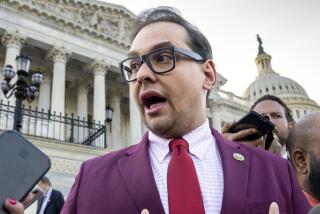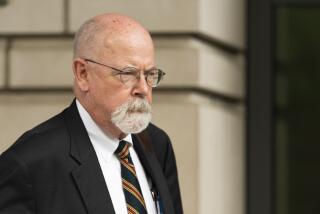Report details prosecutorsâ alleged misconduct in Ted Stevens case
Reporting from Washington and Seattle â A team of government lawyers prosecuting Sen. Ted Stevens of Alaska never fully reviewed evidence that could have bolstered his defense, was inadequately supervised, and withheld information that would have âseriously damaged the testimony and credibility of the governmentâs key witness,â a special counsel said in a report released Thursday.
But Washington lawyer Henry F. Schuelke III stopped short of urging criminal misconduct charges against the prosecutors because, he said, the judge in the case never specifically ordered prosecutors to turn over material helpful to the defense. The judge had expected them to do so, however, to be fair to Stevensâ defense and to comply with the law.
âThis misconduct was intentional,â Schuelke concluded, but he added: âThe evidence is insufficient to establishâ that prosecutors purposely violated criminal contempt statutes.
Schuelkeâs 514-page report on the high-profile corruption case came after a two-year investigation involving more than 128,000 documents and depositions from prosecutors and FBI agents. Now the Justice Departmentâs Office of Professional Responsibility will recommend to Atty. Gen. Eric H. Holder Jr. whether the half-dozen prosecutors should be disciplined.
Stevens, the longest-serving Republican senator in the nationâs history, died in an airplane crash in 2010, at age 86. He had been convicted in October 2008 of failing to report gifts, a verdict that helped cost him his reelection. The conviction was voided within months at Holderâs request after he learned that prosecutors had failed to turn over exculpatory evidence.
âA miscarriage of justice would have been averted had the government complied with the law,â said Brendan V. Sullivan Jr., Stevensâ lead attorney. âThere would have been no illegal verdict. The senator would not have lost the election in Alaska. Instead, the government proceeded by any means necessary to win their case.â
On Capitol Hill, Sen. Lisa Murkowski (R-Alaska) and a group of national legal activists announced a new Fairness in Disclosure of Evidence Act aimed at preventing future government misconduct.
âThe rules in place are not preventing âhide the ballâ prosecutions in cases across the country,â Murkowski said. âThere are a few prosecutors out there willing to put a finger on the scales of justice to get more convictions â and this bill seeks to stop that. Justice should be blind, not blindly ignored.â
At the Justice Department, spokeswoman Laura Sweeney said the government had insisted on âsweepingâ new changes for federal prosecutors. âWe have taken unprecedented steps to ensure prosecutors, agents and paralegals have the necessary training and resources to properly fulfill their discovery and ethics obligations,â she said.
The Schuelke report disclosed that prosecutors ânever conducted or supervised a comprehensive and effective reviewâ of evidence that might have helped Stevens in his defense. Federal agents reviewed the files but were âunassisted and unsupervised by the prosecutors.â
Brenda Morris, principal deputy chief in the Justice Departmentâs public integrity section in Washington, was brought into the case as lead prosecutor at the last minute, even though she had only a âgeneral but not a detailed knowledgeâ of the case, Schuelke said. The rest of the prosecution team, he added, âresented her appointment and Ms. Morris, in an attempt to avoid making the situation worse ⌠did not supervise the prosecutionâ properly.
Morrisâ defense attorney, Chuck Rosenberg, said she âis a woman of tremendous integrity and an exceptionally talented prosecutor.â
During the trial, Schuelke said, prosecutors âencouraged and presentedâ perjured testimony from their star witness, Bill Allen, a friend of Stevensâ whose oil services company, Veco Corp., helped remodel Stevensâ home in Girdwood, Alaska.
The renovations cost about $250,000, but Stevens did not pay nearly that much or report the matter on his financial disclosure statements. Prosecutors did not acknowledge to the defense that Stevens had twice asked for a bill, a disclosure that would have bolstered his testimony.
Schuelke also said prosecutors did not alert defense lawyers that Allen had credibility problems stemming from an incident in which he had encouraged a 15-year-old prostitute to lie about having had sex with him.
Nicholas Marsh, who had handled much of the day-to-day oversight of Alaska political corruption cases, hanged himself in the basement of his Washington home in September 2010.
Friends said he was despondent about his transfer from front-line prosecutorial responsibilities and worried he would be unfairly blamed for the Stevens case and his career ruined.
âNick Marsh acted at all times in complete good faith and with a keen appreciation for his ethical obligations,â said his attorney, Robert Luskin. âUnder difficult circumstances, he tried to do the right thing.â
More to Read
Sign up for Essential California
The most important California stories and recommendations in your inbox every morning.
You may occasionally receive promotional content from the Los Angeles Times.











